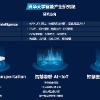Urban Air Mobility (UAM) expands vehicles from the ground to the near-ground space, envisioned as a revolution for transportation systems. Comprehensive scene perception is the foundation for autonomous aerial driving. However, UAM encounters the intelligent perception challenge: high perception learning requirements conflict with the limited sensors and computing chips of flying cars. To overcome the challenge, federated learning (FL) and other collaborative learning have been proposed to enable resource-limited devices to conduct onboard deep learning (DL) collaboratively. But traditional collaborative learning like FL relies on a central integrator for DL model aggregation, which is difficult to deploy in dynamic environments. The fully decentralized learning schemes may be the intuitive solution while the convergence of distributed learning cannot be guaranteed. Accordingly, this paper explores reconfigurable intelligent surfaces (RIS) empowered distributed learning, taking account of topological attributes to facilitate the learning performance with convergence guarantee. We propose several FL topological criteria for optimizing the transmission delay and convergence rate by exploiting the Laplacian matrix eigenvalues of the communication network. Subsequently, we innovatively leverage the RIS link modification ability to remold the current network according to the proposed topological criteria. This paper rethinks the functions of RIS from the perspective of the network layer. Furthermore, a deep deterministic policy gradient-based RIS phase shift control algorithm is developed to construct or deconstruct the network links simultaneously to reshape the communication network. Simulation experiments are conducted over MobileNet-based multi-view learning to verify the efficiency of the distributed FL framework.
翻译:暂无翻译



